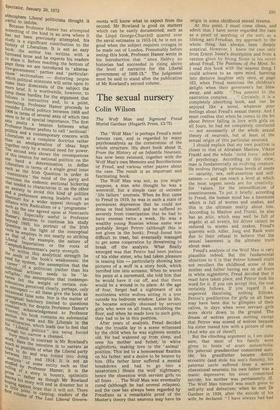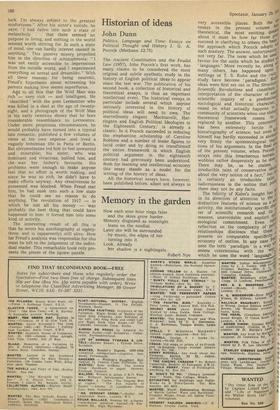The sexual nursery
Colin Wilson
The Wolf Man and Sigmund Freud Muriel Gardner (Hogarth Press, £3.75) The 'Wolf Man' is perhaps Freud's most famous case, and is regarded by many psychoanalysts as the cornerstone of the whole structure. His short book about it, From the History of an Infantile Neurosis, has now been reissued, together with the Wolf Man's own Memoirs and Recollections of Freud, and various other papers about the case. The result is an important and fascinating book.
The Wolf Man was not, as you might suppose, a man who thought he was a werewolf, but a simple case of extreme life failure' neurosis. When he first came to Freud in 1910, he was in such a state of permanent depression that he could not dress or feed himself, and he suffered so severely from constipation that he had to have enemas twice a week. He was a wealthy young Russian whose name was probably Sergei Petrov (although this is not given in the book). Freud found him difficult to treat, but eventually managed to get some cooperation by threatening to break off the analysis. What finally emerged was that Petrov had been jealous of his elder sister, who had taken pleasure in teasing him — particularly showing him pictures of a wolf in a story book, which terrified him into screams. When he waved his penis at a nursemaid, she told him that he would have it cut off, and that there would be a wound in its place. At the age of four, Sergei had a nightmare of six motionless white wolves sitting in a tree outside his bedroom window. Later in life, he became sexually obsessed by servant girls who were on all fours, scrubbing the floor, and when he made love to such girls, they had to be in this position.
After years of analysis, Freud decided that the trouble lay in a scene witnessed by the child when he was eighteen months old. He had wakened up from sleep, and seen his mother and father, in white nightshirts, making love in the ' animal ' position. This led to a homosexual fixation on his father, and a desire to be beaten by him. (His father later suffered a mental breakdown and had to go into a sanatorium.) Hence the wolf nightmare; hence the obsession with servant girls on all fours . . . The Wolf Man was eventually cured (although he had several relapses), and the case has always been regarded by Freudians as a remarkable proof of the Master's theory that neurosis may have its origin in some childhood sexual trauma. At this point, I must come clean, and admit that I have never regarded the case as a proof of anything of the sort; as a
lifelong anti-Freudian, my approach to the
whole thing has always been deeply sceptical. However, I knew the case only from Ernest Jones's description and from a version given by Irving Stone in his novel about Freud, The Passions of the Mind. So I read this book with the nearest thing I could achieve to an open mind, bursting into derisive laughter only once, at page 163, when Freud mentions the children's delight when their governess's hat blew away, and adds: "This pointed to the castration complex. . . " Certainly, it is a completely absorbing book, and can be enjoyed like a novel, whatever your feelings about Freud's sexual theory. And I must confess that when he comes to the bit about Petrov falling in love with girls on all fours, he had me completely convinced — not necessarily of the whole sexual theory of neurosis, but at least of the sexual origin of this particular neurosis.
I should explain that my own position is closer to that of Abraham Maslow, Viktor Frankl and the whole 'third force' school of psychology. According to this view, man is fundamentally an evolving creature. He evolves through various levels of needs — security, sex, self-assertion and selfesteem — and can reach a level at which the most urgent needs are for creativity, for 'values,' for the intensificat:on of consciousness. To put it briefly: according to Freud, the human mind has a basement which is full of worms and snakes, and this is the ultimate reality about him. According to Maslow and Frank', he also has an attic, which may well be full of angels; at all events, his drives cannot be reduced to worms and snakes. Freud's quarrels with Adler, Jung and Rank were due to their refusal to believe that the sexual basement is the ultimate truth about man.
Freud's analysis of the Wolf Man is very plausible indeed. But the fundamental objection to it is that Petrov himself could not recollect the childhood scene of his mother and father having sex on all fours in white nightshirts; Freud decided that it must have taken place, and Petrov took his word for it. If you can accept this, the rest certainly follows. If you regard it as unproved theorising, nothing follows. Petrov's predilection for girls on all fours may have been due to glimpses of their calves, in days when even servant girls wore skirts down to the ground. The dream of wolves proves nothing except that Petrov was scared of wolves because his sister teased him with a picture of one. (And why six of them?) But the clinching argument is, I am quite sure, that most of his family were given to bouts of acute melancholia; his paternal grandmother committed suicide; his grandfather became dottily eccentric (and stole his son's fiancée); his paternal uncle suffered from a severe obsessional neurosis; his own father was a manic depressive; his sister committed suicide; his mother was permanently ill. The Wolf Man himself was much given to self-pity and defeatism; when he met Dr Gardner in 1938, after the suicide of his wife, he declared: "I have always had bad luck. I'm always subject to the greatest misfortunes." After his sister's suicide, he says: 'I had fallen into such a state of melancholy. . . that there seemed no purpose in living, and nothing in the world seemed worth striving for. In such a state of mind, one can hardly interest oneself in anything." This passive misery propelled him in the direction of schizophrenia: "I was not easily accessible to impressions from the outside world, and I experienced everything as unreal and dreamlike." With all these reasons for being neurotic, Freud's hypothesis about witnessing his parents making love seems superfluous.
Add to all this that the Wolf Man was rich .— very rich — and intelligent. He ' identified ' with the poet Lermontov who was killed in a duel at the age of twentyeight, and a photograph of the Wolf Man in his early twenties shows that he bore considerable resemblance to Lermontov. Under more propitious circumstances, he would probably have turned into a typical late romantic, published a few volumes of verse at his own expense ,and lived a vaguely bohemian life in Paris or Berlin. But circumstances led him to feel unwanted and miserable; his sister, who was dominant and vivacious, bullied him, and she was her father's favourite. His problems were enough to make anyone feel that no effort is worth making; and since he was so rich, he didn't have to make efforts anyway. Any creativeness he possessed was blocked. When Freud met him, he had sunk into such a low state that he could see no reason to do anything. The revolution of 1917 — in which he lost all his money — was probably the best thing that could have happened to him: it forced him into some kind of activity.
The interesting result of all this is that he wrote his autobiography at eighty three, and is (apparently) still alive. How far Freud's analysis was responsible for this must be left to the judgement of the individual reader. This remarkable book only presents the pieces of the jigsaw puzzle.











































 Previous page
Previous page